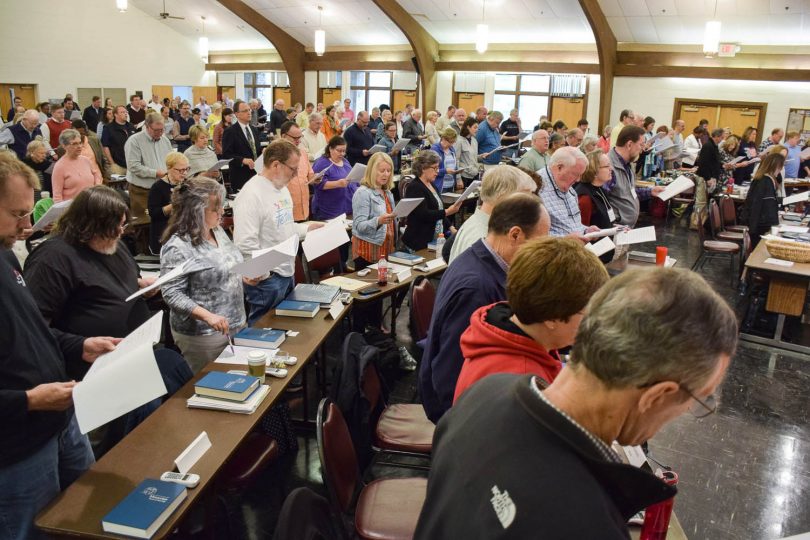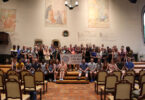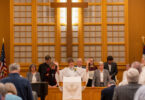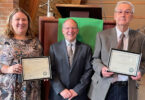In April, more than 230 delegates to the 2018 Southern Province Synod developed, discussed, debated and passed more than 20 resolutions that will guide the core of the Province over the next four years.
Synod is the highest governing body within the polity of the Moravian Church Southern Province. These every-four-year gatherings bring together clergy and lay leadership from all congregations, along with representatives from key agencies and ministries within the provinces. Delegates are tasked with discerning the future direction for the church and making key decisions on issues and initiatives brought before Synod.
Over the four days, delegates reviewed dozens of proposals from working groups across the Province on a wide range of topics. Some proposals represented central issues facing the church; others dealt with the church’s Constitution and Book of Order. Still others focused on provincial organization or new initiatives designed to enhance the operations of the Province. And some proposals sought to declare church positions on topics like immigration, gun safety, prison ministry, world missions and more.
In addition to reviewing and passing resolutions, Synod delegates elected two bishops, members of the Provincial Elders’ Conference and trustees for many of the boards leading church ministries.
What follows is a summary of the final resolutions passed during the 2018 Southern Province Synod. Additional information about many of these initiatives will be shared by the Provincial Elders’ Conference in coming months.
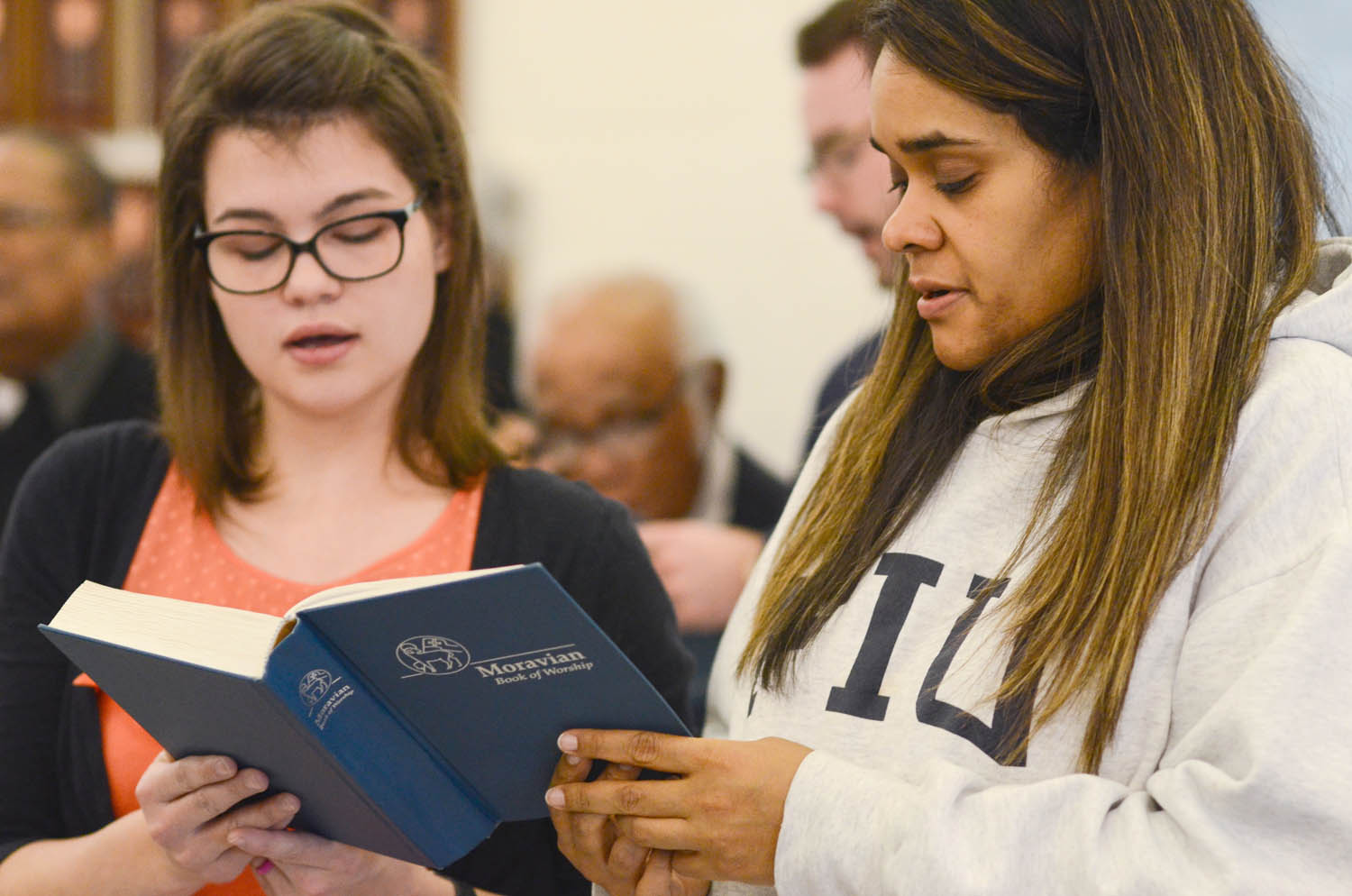
Hannah Jackson and Hazel Hooker sing during Synod worship.
Major legislation
Full Communion between the United Methodist Church and Moravian Church, Southern Province—
Synod delegates affirmed a full communion relationship with the United Methodist Church (UMC). This relationship includes recognizing the gifts of each church; respecting each other as part of the one holy catholic and apostolic church; cooperating in evangelism, witness and service; mutual recognition of baptism (membership) and ordination, allowing for transfer of membership; and continued work for the unity of the church.
This agreement was developed over several years and was approved by the UMC General Conference in 2016. It will be brought before the Northern Province Synod in June for consideration. The Moravian Church Southern Province is now in full communion with the Evangelical Lutheran Church in America, the Episcopal Church, the Presbyterian Church USA and the United Methodist Church. For more on this full communion agreement, see the story on page 16. (Resolution 1)
Affirming the Essentials—
In an effort to more clearly define and articulate the central tenets of our church, Synod affirmed the ancient Moravian understanding of the essentials of our faith: God creates, God redeems, and God makes us holy; and we respond in Faith, Love and Hope. Synod also resolved that “Moravians in the 21st century are grounded in the living experience of faith in Christ, active love for others, and joyful hope,” and “this living relationship with Christ is born and nurtured in faith communities, in relationship with and in service to one another and the world.” The PEC was encouraged to prepare resources that enable us to study, further understand, and live out the Essentials of the Moravian Church. This Resolution will be shared with the PEC of the Northern Province for potential inclusion in their 2018 Synod. (Resolution 22)
Synod also took up several resolutions that sought to allow differing opinions on controversial subjects to exist within our Moravian Unity. Further explanation and discussion on these topics will be ongoing throughout the Province.
Mutual Respect and Acceptance—
In this resolution, Synod reaffirmed its stance on mutual respect and acceptance of differing opinions, resolving that “the Moravian Church, Southern Province, will recognize among its members the adherence to and expression of differing opinions related to homosexuality,” and resolved that “any person, group, congregation, agency and entity within the Southern Province retains the right to make opinions related to LGBTQ+ issues known, without fear of recrimination, provided such opinions live up to our covenant: ‘We will not hate, despise, slander or otherwise injure anyone.’ ” (Moravian Covenant for Christian Living). (Resolution 13)
Leadership Roles and Diversity of Views—
Following Resolution 13, Synod received the report of the 2014 Resolution 12 Steering Committee, accepted its conclusions and observations, and affirmed “that through this conversation process, we have learned and experienced that our unity in Christ is far greater than our differing views and understandings about homosexuality and the church, and we can be welcoming, respectful and loving toward one another in our differences.” (In the summer of 2014, the Southern Province Provincial Elder’s Conference appointed a steering committee to fulfill the mandate of the 2014 Synod’s Resolution #12, “Study and Discernment Regarding Homosexuality.” One of the legislation’s key resolved statements was “to provide leadership, resources and a process for a conversation about homosexuality in the church that includes diverse viewpoints, and opportunities for open and honest discussion, study and discernment.”)
Based on this work, Synod passed a resolution (Resolution 14) that affirms the role of pastors and boards of elders (or church boards) in determining within the congregation “who is or is not admitted into membership or leadership, who may or may not participate in rites (confirmation, marriage) and sacraments (baptism, communion) and the purposes for which church buildings [and properties] may be used.” Synod affirmed the “freedom of conscience of pastors to decide whether or not to administer a rite or sacrament in any particular situation.” This allows congregations and pastors to determine whether or not they will perform legal same-sex marriages in their churches.
Synod also affirmed the role of the PEC in matters related to candidacy for ordination, approving ordinations of deacons and consecration of presbyters, administering the call process, and calling and superintending the ministers of the Province. To help maintain unity, Synod affirmed “there are differences among us in [these] matters, and we will be respectful of one another’s viewpoints, and of the roles, discernment and decision of our pastors, church boards and of the PEC.”
Finally, Synod directed the PEC to develop resources and materials to assist pastors, church boards, and congregations in their dialogue, discernment and decision-making on this topic, and encouraged congregations to use the resources.
The core proposal brought to Synod was developed by Moravian pastors with differing positions who were asked by the PEC to explore whether they could come to consensus on a proposal. The proposal was amended in the Synod community committee after lengthy discussion.
Debate on the Synod floor was emotionally charged but respectful. Pastors and lay members expressed a range of opinions for more than two hours, after which the proposal was approved with a vote of 116 to 63.
The PEC is now doing additional work to clarify and explain how this resolution affects the congregations in the Province. More information will be share over the next few months.
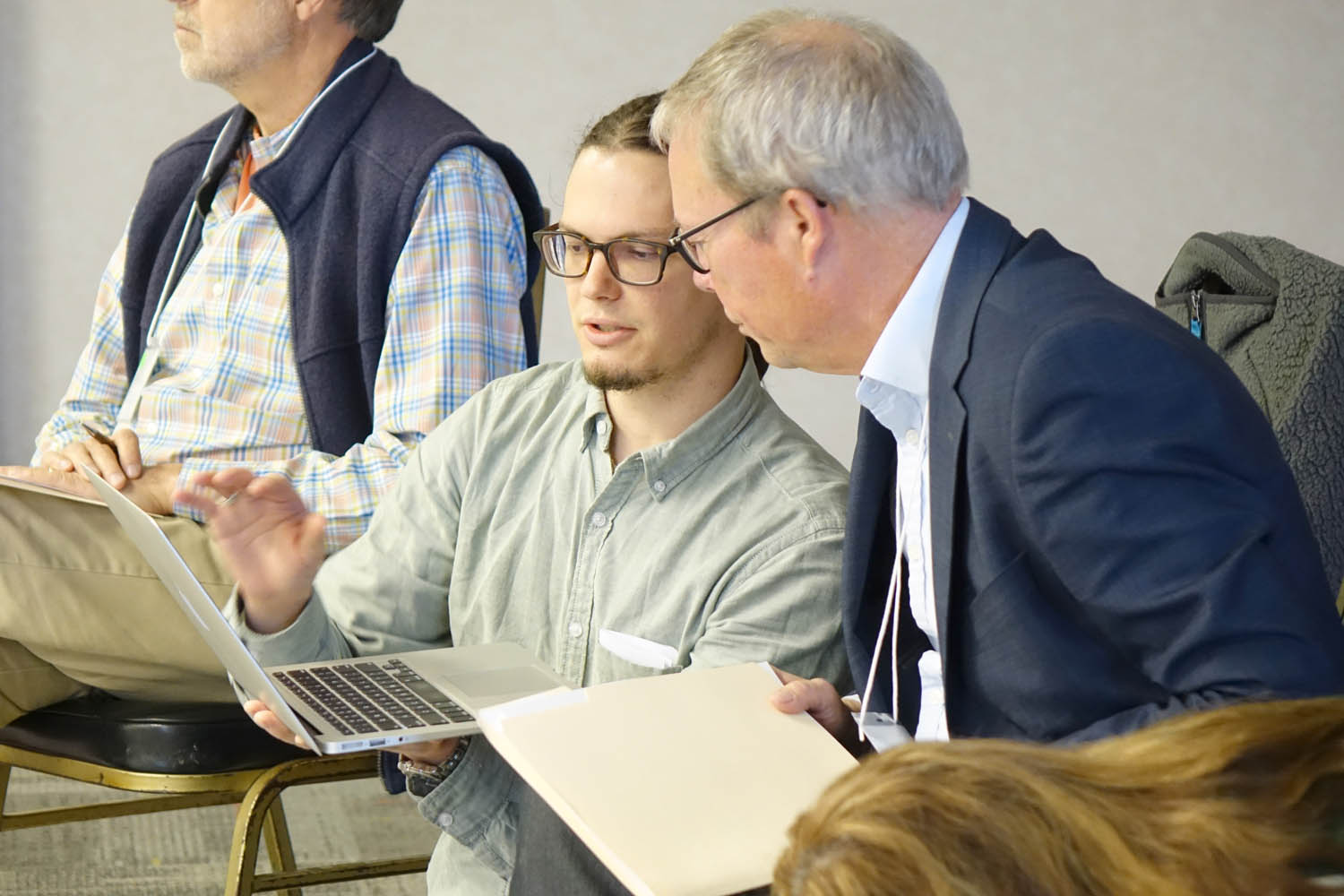
The Rev. Aaron Linville discusses wording of a proposal with visiting Unity Board Administrator the Rev Dr. Jørgen Bøytler.
Provincial Structure & Organization
Following the theme, “Living the Essentials with Courage for the Future,” the 2018 Synod passed several resolutions that address the future organization of the church. These resolutions call for reviewing how the Southern Province is organized and exploring structural changes for a better future.
Provincial Organization Core Team—
Synod directed the PEC to form a core team by September 2018 which, with assistance, input and support from PEC and provincial agencies, will “clarify primary functions of the provincial system” to better support the mission of congregations and other groups; support and develop clergy and lay leaders, collaborative partnerships, and initiatives in the wider community and with other provinces and denominations; provide administrative support for local communities of faith; and develop and share accessible, relevant faith-formation resources. The core team will learn about organizational models and make recommendations to the PEC by the spring 2020. The PEC will review these and propose organizational changes, and is authorized to determine whether to implement these changes during the intersynodal period. (Resolution 17)
Renewing and Reimagining Faith Communities—
In another resolution aimed at rethinking how the Province is organized, Synod agreed to create a new framework for congregational and ministry organization with three designations: parish communities, chapel communities and mission communities. Current congregations will determine how they fit within this framework by January 2021, with support from a team and a process selected by the PEC. Once designated, these faith communities will continuously work on development, and evaluate their future course once every two years.
In addition, the Provincial Support Services Board will revise the provincial share allocation methodology to reflect these three, new designations. Synod authorized the PEC to administer this process with flexibility regarding current criteria and definitions within the Book of Order. (Resolution 18)
Provincial Share Methodology—
The 2018 Synod provided a revision to methodology for determining the provincial share allocation for congregations—that is, how much congregations pay for common ministries through the Province—to include a four-tiered percentage approach (10%, 12%, 15%, 18%). This share will be based on several factors, including: average worship attendance, Line 1 income in church budgets, relief granted in prior years, success in meeting prior provincial share allocations, and transfers from reserves to meet operating costs. The assigned percentage will remain the same during the intersynodal period. This methodology will likely change when the framework outlined in Resolution 18 is fully implemented. (Resolution 10)
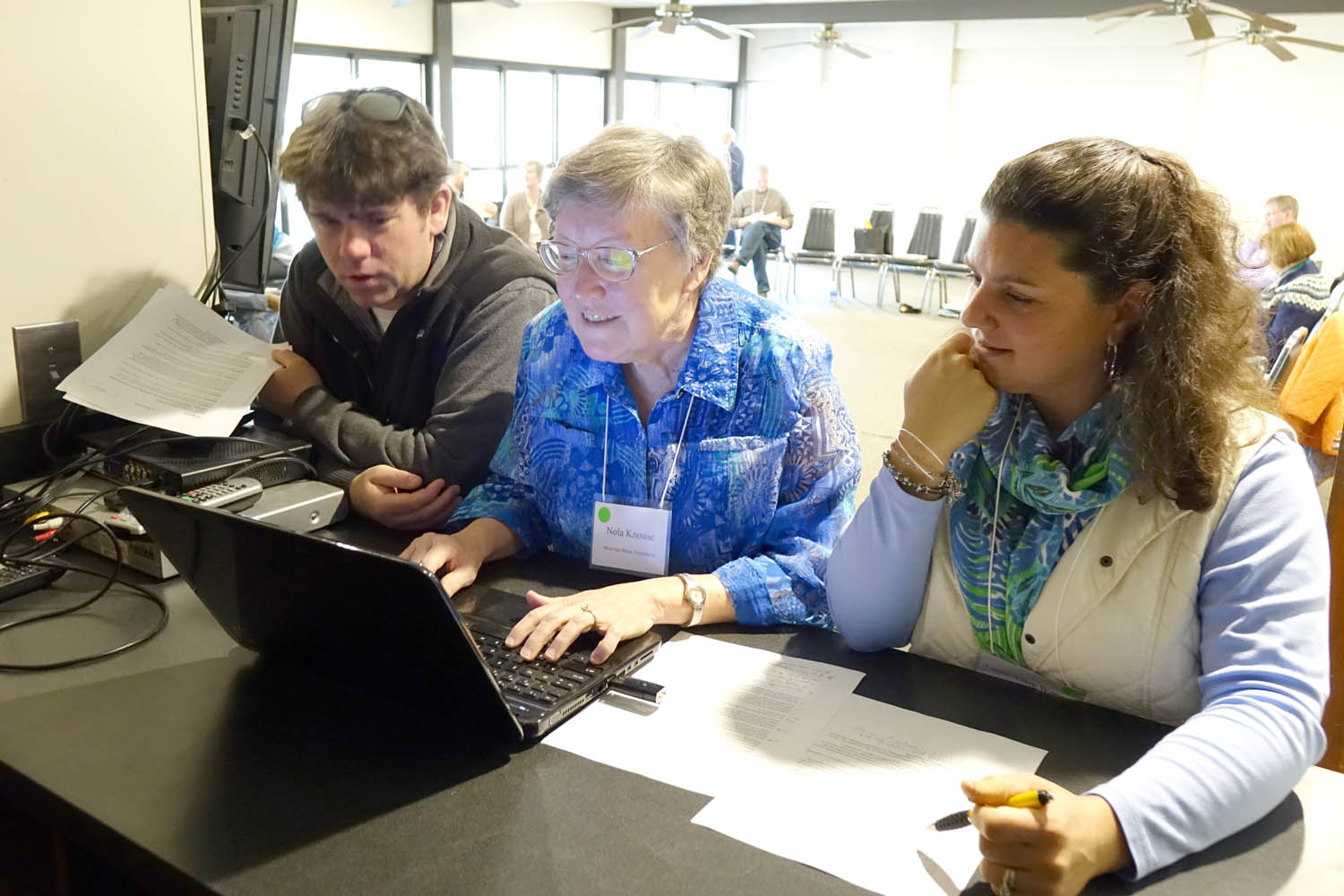
The Rev. Zach Dease, the Rev. Dr. Nola Knouse and Laura Watson work on a proposal from the Stewardship Committee.
Resolutions on Mission and Ministry
The 2018 Synod addressed provincial missions and ministries in several resolutions.
Moravian Day of Service—
In an effort to create a Southern Province-wide outreach event, this resolution calls for the Provincial Elders’ Conference (PEC) to designate a Saturday to be an annual “Moravian Day of Service” starting in the spring of 2019. On the Moravian Day of Service, individuals will serve together in congregations, regional conferences of churches and/or other groups. Along with creating the Day of Service, the PEC will commission a core group to develop the day and will provide an outline for worship for all congregations to use. Pictures and stories will be shared and communicated within the Province and beyond. (Resolution 2)
Sharing Moravian Best Practices with Southern Province Families—
Synod resolved that the Board of Cooperative Ministries make it possible for parents and caregivers to receive weekly resources from Loving Hearts United: A Moravian Guide for Family Living, a printed resource for forming a spiritual bond in family, church and home published by the Interprovincial Board of Communication (IBOC). This effort is designed to provide greater access to Moravian-specific material for family use. (Resolution 5)
Interprovincial Collaboration—
Synod resolved that within the next year, agency heads and representatives from all provincial and interprovincial agencies, and from both PECs (Southern and Northern), will meet for a multi-day summit to develop collaborative initiatives between the Provinces. This group will report its activities at upcoming synods or intersynodal gatherings. This resolution is designed to provide more intentional cooperation, resource-sharing and efficiency with related church agencies, all to help make the most of the church’s resources. The resolution will be provided to the Northern Province PEC for consideration at the 2018 Northern Province Synod. (Resolution 3)
Laurel Ridge 60th Anniversary Capital Campaign—
In consultation with the PEC, the 2018 Synod affirmed the Board of Directors of Laurel Ridge’s request to conduct a capital campaign of no more than $1.5 million, the proceeds of which will be used for renovations, repairs and improvements to Higgins Lodge and the Tise Building; all financial debt obligations; and to build an endowment and maintenance reserve fund for Higgins Lodge. (Resolution 8)
Southern Province Mission and Ministry Fund—
Synod recognized the creation of a Mission and Ministry Fund for the Province. This fund is a permanent endowment to which individuals, groups and congregations may contribute, and will be used for sustaining pastoral leadership, mission and outreach, and congregational development and renewal. The resolution stipulated the establishment of the fund by PEC; authorized PEC to adjust details and implementation and to communicate throughout the Province about this fund; and to bring a report of any fund activity to the 2022 Synod. An oversight committee will bring to future Synods their recommendations of priority needs and opportunities for use of the fund earnings. (Resolution 9)
Statements on social Issues
Synods often address social and ministry concerns, and the 2018 Southern Province Synod addressed several.
Our Church’s Concern for Ministry in Prisons—
The first considered was prison ministry. Synod commended prison ministry to all Southern Province congregations, inviting them to participate on the Sunday designated in the Province as the day of prayer for prison ministry, along with providing ongoing support to prison ministries through prayer, mission committees, fellowship fund-raising, and individual financial giving. (Resolution 11)
Moravian Statement Concerning Immigration—
The 2018 Synod also addressed immigration, reaffirming the church’s position of opening our church doors to share the Gospel with everyone in the community, regardless of their legal status. This Synod also stated that “both as individuals and as a Christian body, our Moravian Church should stand against injustices to the marginalized and the voiceless among immigrants.” Synod recommended that congregations be aware of challenges the church faces in working with immigrants within local communities, and to support mission efforts that go and share the good news of Christ to everyone and anyone in love. (Resolution 12)
Continuing the Journey of Reconciliation—
Synod reaffirmed the church’s 1998 “Statement on Racism and the Church” as the official position of the Southern Province, and called the province to live what is professed in the Ground of the Unity regarding opposing discrimination. Synod supported the work of the former Moravian Team for Racial Reconciliation, renamed it the “Moravian Team for Racial, Cultural and Ethnic Reconciliation,” and requested this team develop resources, materials, experiences and programs for congregations.
Synod stipulated that congregations will report annually to the PEC how they are using the statement and these resources. In addition, PEC will initiate intentional conversation with churches and denominations with diverse racial, cultural, or ethnic membership to explore cooperation in mission and service. (Resolution 19)
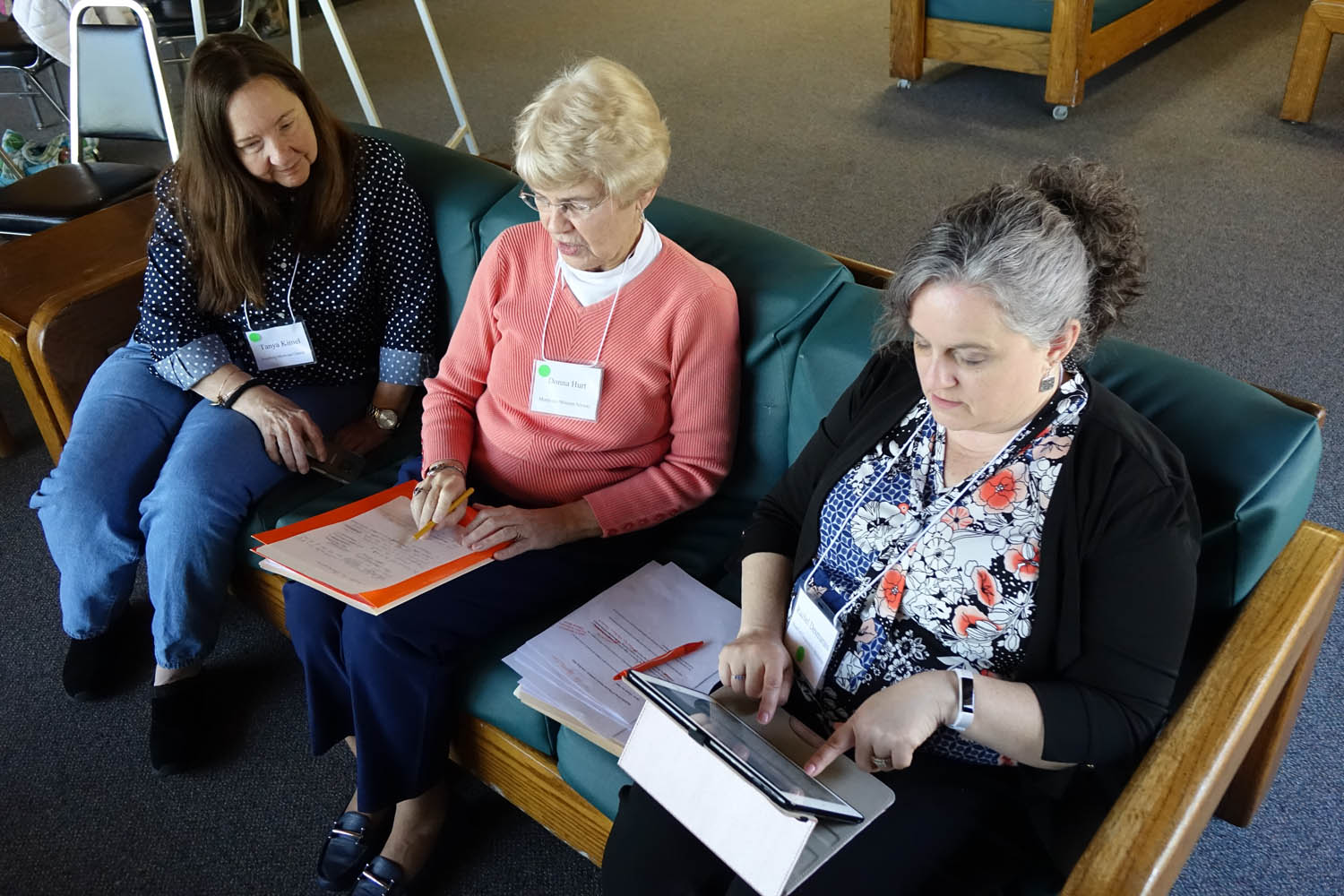
Tanya Kimel, Donna Hurt and Rachel Demaris discuss edits to a proposal during a committee meeting.
Global Missions—
Synod adopted an ecumenical statement, which was also adopted at the 2017 Unity Mission Conference, in Cape Town, South Africa: “Christian Witness in a Multi-religious World.” This will be communicated to the Board of World Mission, the Mission Society, and all our congregations, and the statement will be posted on the Province’s website. (Resolution 20)
Gun Safety—
Synod resolved that the province call upon the president and congress of the United States, and the governors and legislatures of the states in which we have congregations and fellowships to “enact laws banning the sale of military-style assault weapons, and requiring universal background checks for all purchases of firearms.” Synod tasked the PEC to communicate this resolution to the national and state leaders mentioned above, by whatever means the PEC deems most effective. (Resolution 21)
Synod Governance
Any changes to the Southern Province’s Constitution or Book of Order must be made at the Synod level. In 2018, Synod approved several changes dealing with elections, terms of office, and synod representation.
Election of Bishops—
One important role of Synods is the election of bishops. While it is customary to elect only one bishop at a Synod, this Synod resolved to elect two bishops during the 2018 gathering. The Revs. Carol Foltz and Tom Shelton were subsequently elected (see the story on page 15). (Resolution 4)
Membership Status for Election by Synod/Term of Office for the PEC President—
The 2018 Synod made changes to the Constitution of the Moravian Church Southern Province codifying long-standing practices. The changes now state: “Members of the PEC and of other boards shall be elected at stated Synods from among the communicant membership or Moravian clergy serving under call of or appointment by the Southern Province,” and “Members of the PEC (with the exception of the President, who shall not be subject to term limits) and members of the various boards elected by Synod, shall serve for one term of four years after which they may be eligible for re-election to a second term of four years, subject to a reasonable rotation of membership established by the board.” (Resolution 6 and 7)
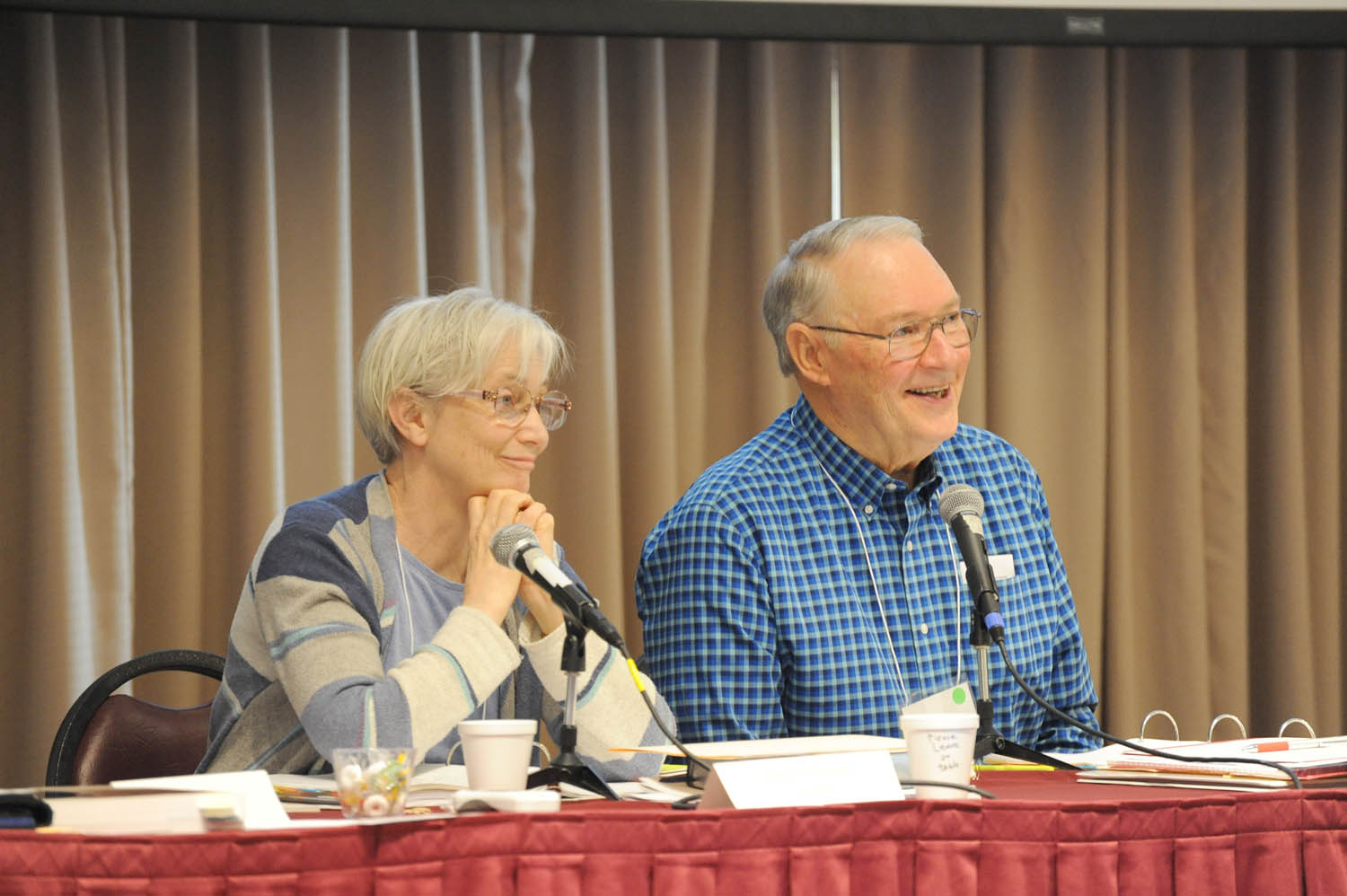
Synod co-chairs the Rev. Ginny Tobiassen and Bob Hunter led the 2018 Southern Province Synod.
Representation at Synod—
In addition to the constitutional changes made to the election process, Synod also made changes that impact representation at future Synods. First, the Constitution was revised to add the following as voting members of Synod: director of Laurel Ridge Camp and Conference Center; executive director of the Interprovincial Board of Communication; director of the Moravian Music Foundation; president and CEO of the Moravian Ministries Foundation in America; and director of Sunnyside Ministry of the Moravian Church.
Second, the Constitution was revised so that congregations who do not meet the financial requirements stated in the Constitution will not have delegates seated at Synod. The PEC retains the authority to grant representation with voting privileges if it deems there are justifiable reasons to do so. (Resolutions 15 and 16)
More work ahead
A number of significant proposals adopted by Synod committees were unable to be considered and acted upon by the full Synod due to time constraints. Synod voted to deliver these proposals to the PEC for information and possible action. These proposals deal with the call process, the stewardship of Creation, the development of potential commissions on Moravian Evangelism, music and worship and public relations, development of lay pastors, awareness of violence against women, and the vitality of spiritual growth.
During the next several months, the newly elected PEC will work to plan the implementation of the resolutions passed at Synod. All passed resolutions are now posted to the Southern Province website, www.mcsp.org.
Article based on material compiled by the Southern Province PEC, edited by Mike Riess, IBOC. Photos by Mike Riess and Andrew David Cox, Board of Cooperative Ministries. Quotes from the BCM’s Spotlight Blog. For more photos from the Southern Province Synod, see page 29 of the May 2018 edition of the Moravian Magazine.

Delegates the Rev. Dr. Neil Routh and Kobi Robinson prepare to vote on a proposal during Synod.

